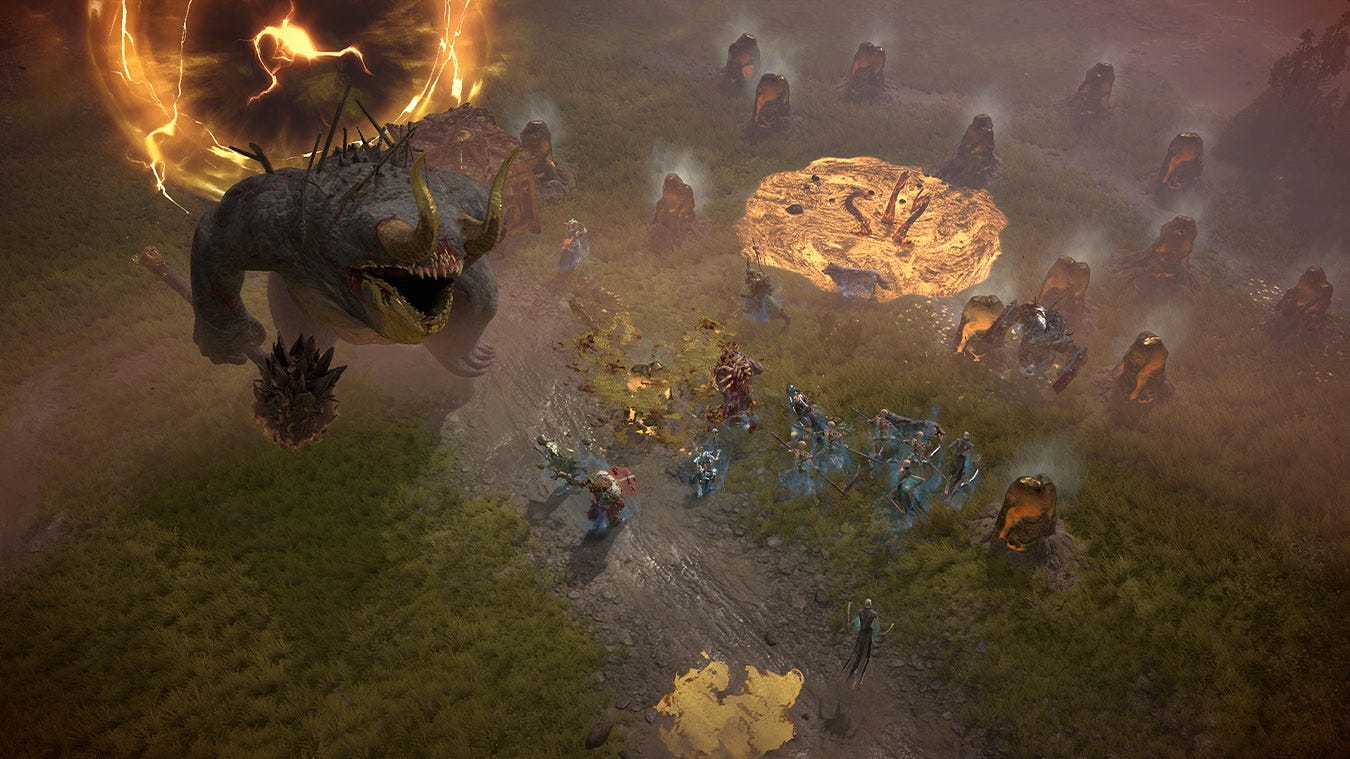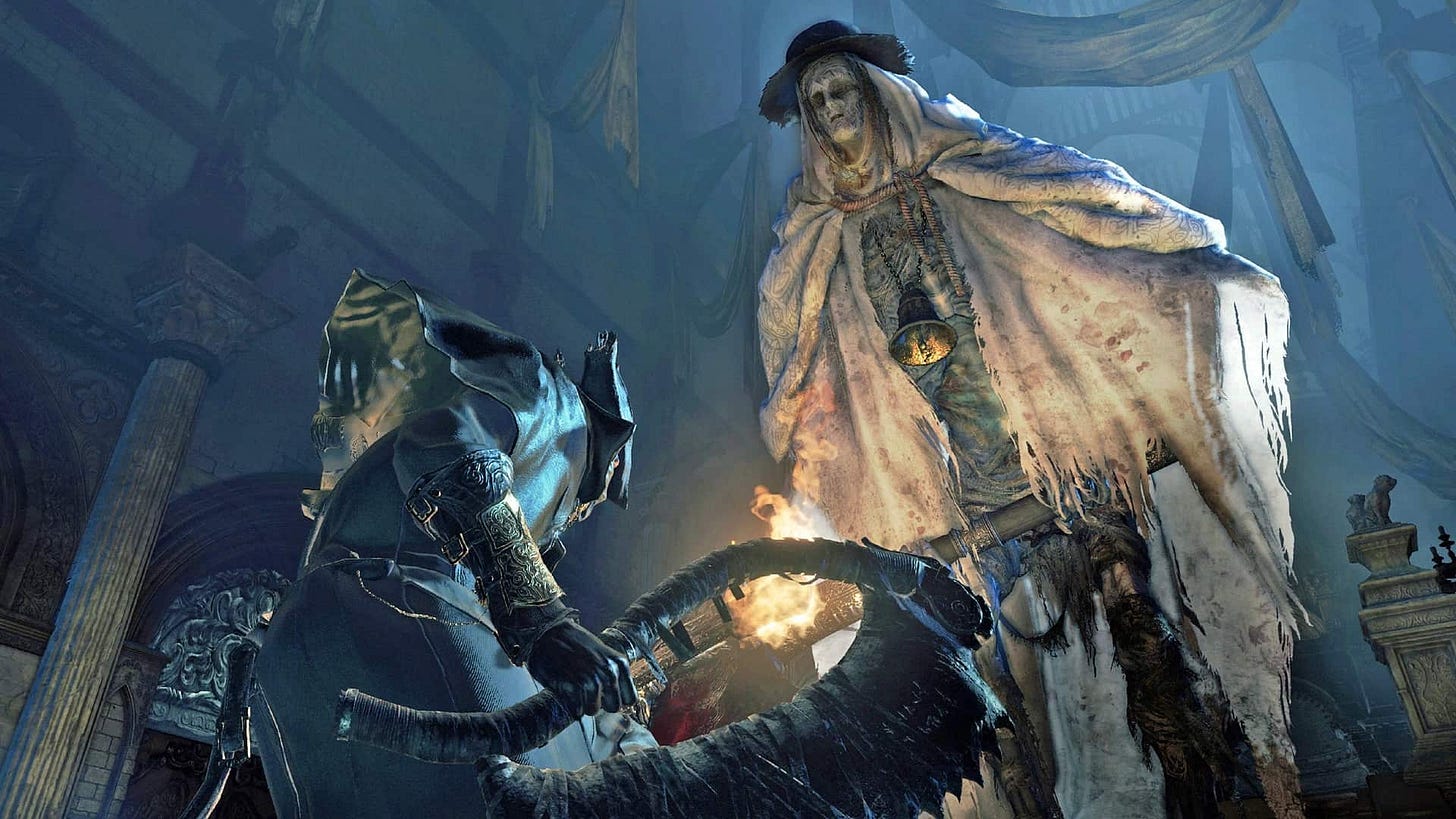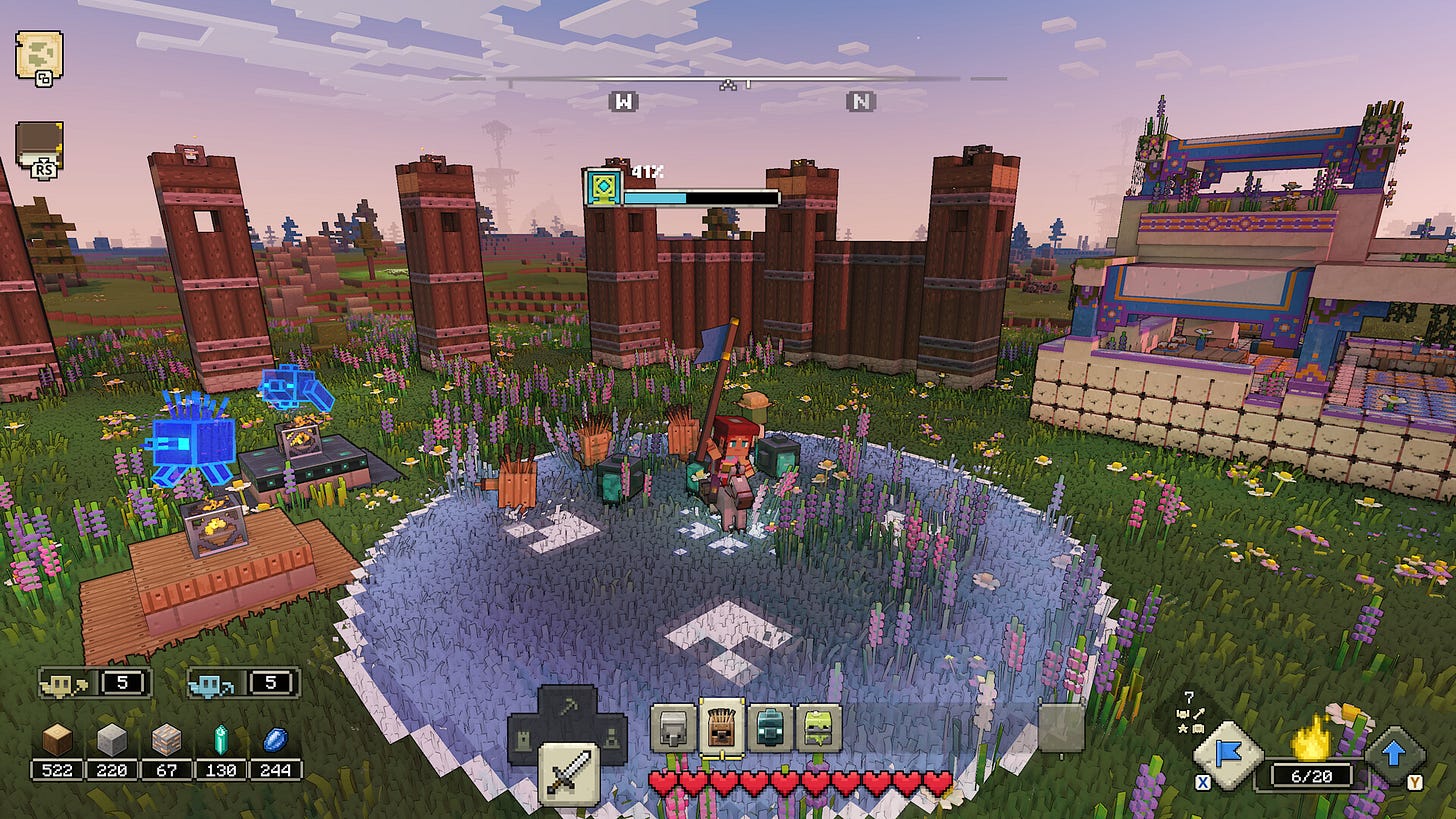10 Things I learned from Video Games
Life lessons come from all experiences
Dear kind reader,
Wow, what a streak of amazing weather we’ve had in Ireland over the last couple of weeks. The days have been long, hot and busy, as is the way at this time of the year. People visit, everyone is out and about, and events/festivals are kicking off.
I’m trucking away on my daily ‘Reading the Signs’ June challenge. You can read all the entries so far on that section of my newsletter, and check out the chat section every morning which gets it going. It’s been an interesting practice so far.
Today’s newsletter is an article I’ve been thinking about writing for several years. I even considered pitching it to some magazine/journal, but in the end it stayed in my ‘ideas’ section and was never realised.
Finally, it will have its moment!
To preface this I should mention my history with video games, so you have an idea of the systems I’ve used. As I mentioned in my ‘Confessions of a Doomscroller’ article, I’m an old school geek. My parents owned an arcade, and we had a computer, so I grew up as an early adopter and devotee of tech and games.
Since the early days of using a Commodore 64 I’ve played games on arcade style cabinets, the PS2, the PS4, the Wii, Nintendo DS, various mobile phones/tablets and probably every iteration of a Windows-based PC since 3.0. I’ve also enjoyed almost all the varieties of games there are out there, including MMORPGs, educational games, strategy games, sports games, puzzle games, first person shooters, etc.
These days I tend to play mostly on my PS4, and I often stick to one or two games that I use to blow off steam. As an example, this article is partly inspired by the release of Diablo IV, which I’ve been playing this weekend. I’ve played all the versions of Diablo so far, and I often team up with my husband to get through particularly tough sections, or fight my way through on the hardest settings.
It’s always struck me that people can learn a lot of useful skills from playing games. And I’m not talking about motor skills, but life lessons that are transferable outside of gaming. This is a pastime that is often depicted as frivolous, but is far more active than binge-watching a series on Netflix, and it can come with a social dynamic.
1. Don’t stand in the fire
This is a very important lesson in games, and it can be a hard to master when you are in a sweaty battle against a high level creature, while using all your abilities to deal damage, heal and avoid being killed.
It’s such popular advice that there are hundreds of memes and video clips about this. For me, this advice solidified when I was playing World of Warcraft, which is a Massively MultiplePlayer Online Role-Playing Game with a fantasy setting. This is vital when you are working with other players as a team to explore a dungeon and eliminate the final boss. They’re always a chore, and have a nasty habit of summoning minions to distract you while they hit you for colossal damage, and of course, conjure the dreaded ‘area of effect’ — e.g. randomly turning the floor to lava (or acid pools, etc.).
There’s a strong urge to stay in one place when you are under attack because you are stressed and are trying to remember all the key combinations to your best attacks while finding a couple of seconds to heal yourself.
But that boss wants to stay alive and it’s designed to be the worst kind of adversary. That’s its job.
At some point you are going to have to get out from behind the wall and dart about. You have to be willing to take damage in order to beat this level. Games are fun but also tense as you mind doesn’t know much difference because a real threat (Tiger!) and an invented threat (Gorgon!).
It’s simple advice, but weirdly hard to remember sometimes: if the floor is on fire, don’t stand in it, get out. Sometimes we are paralysed by our problems and expend so much energy keeping ourselves intact that we forget the most basic rule of survival: move.
2. Timing is everything
This is applicable to the above lesson. If the floor is on fire, watch the patterns and figure out where you will be safe without taking damage, for a while. This can require a lot of planning and mistakes, but you will get it right eventually if you keep trying.
There are plenty of games where it’s a ticking clock you have to beat and not a gnarly monster. Certain environments or effects may be static but you must jump, run and duck in a particular sequence to get to the end of the level. You might even get bonuses for snagging rewards as you do all of that.
And in life, so much of what people perceive as luck is simply timing.
You completed the right sequence at the correct time and you land a super reward. The trick is to keep going forward, practising, innovating, and accepting that some days the pixels are not in your favour.
3. Practice makes the heads pop off
The fundamental rule of playing games is practice. It’s rare that you will be instantly good on your first attempt. You’ve new sequences to master, you must figure out your objectives, and what’s the best order in which to tackle them. Even a game like Tetris has its beginner levels that train you up before the difficulty increases.
I used to be terrified of PvP - Player versus Player. I was terrible in the beginning. It was zero body count for me so often, and if I was playing with a team, where the objective was to kill your opponents as quickly or as often as possible, then I felt enormous stress to help out in some fashion. In the beginning it felt like a humiliating experience to be that bad in front of my fellow players.
I had to embrace the suck. I had to recognise my frustration and not let it escalate. Usually, the main person who is egging on your aggravation is your own internal critic. Sure, other characters might be using emotes or voice chat to make fun of you, but you can mute the chat and ignore the emotes. You have to address the voice in your head that’s berating your game play.
I became a decent player through practice and learning what I’m good at, which is often being the support person to the expert player. As long as I’m keeping the other team from achieving their goals then I’m helping — even if it means I’m sacrificing myself for the team. It’s all about reframing your learning experience.
Every now and again I am matched with teammates where I end up being the best player. If I achieve a high score I log off and savour the moment. Algorithms change, weapons get nerfed, game maps are retired — it’s rare to remain on top.
Everyone starts as a newbie. Dedication is all that stands between you and being a better player.
4. Altruism is rewarding
If you love a certain game, and play it a lot, you will become an adept. One day you’ll be able to snipe enemies while taking fire and running between cover or have the perfect combination of moves to take down the toughest bad guys within seconds. There is a deep satisfaction at being this good at a game.
When I’m understand a game deeply, and I’m playing with random players, I like to help out. If the person is struggling then I try to cover for them and point them in the right direction. It could be a thirteen-year-old kid who is navigating that character for the first time, or a seventy-year-old veteran.
If someone doesn’t want my help — perhaps they want to solo learn — I back off. I try to keep encounters good-natured. I’ve had dungeons reset multiple times because our group kept dying in the final scene. This is annoying (especially if a player keeps standing in the fire) but there is a sweet, sweet satisfaction when you beat the boss and can celebrate with your fellow players.
This leads to the reverse observation:
5. Don’t be a dick.
You’re going to encounter players being egotistical, rude and obnoxious. There’s nothing you can do about it There’s a certain set of people who enjoy this kind of behaviour and make it their objective to wind you up.
They have decided to pretend there isn’t a real, living person behind the avatar they are seeing, and are getting rid of their own pent-up stress by being jerks.
Let it go. Don’t be a dick back to them. They love that, and it will egg them on.
Where are you now? In a pissing contest with (probably) a teenager.
Sometimes just laughing and showing you don’t care can irritate them so much they will wander off. And you can always turn off your game and start another instance. If you witness serious bullying behaviour you can report it, as this kind of thing isn’t tolerated in most games any more. Help out anyone you see who is enduring this kind of aggression — they’re probably new and could use the support. It will mean the world to them.
6. If the game isn’t fun, it’s okay to leave it unfinished
Not every game is going to suit you. There’s a certain set of games (I’m looking at you Bloodborne) that are difficult right out of the box. There’s no training level, it’s just hardcore, in your face, and part of the attraction to this kind of game is the sheer grit it requires to advance and get better.
For me there’s a balance between the difficulty level and how much I enjoy the game. I’ve had to give up on certain games because my determination was worn down by the lack of joy involved.
If I realise the game is a slog and I’m angry all the time, then I know I have to stop.
It’s just a game! Play something else that you enjoy. I do not understand people who rage-play a game, just as I don’t understand people who rage-follow someone on social media. Why do this to yourself?
I’m not wired for that kind of gaming, and that’s okay. It’s not what I like. Best of luck to the ones that do.
7. Pay attention if you get lost in side quests
Most games have a main narrative storyline that you follow, with a number of side quests that are there to help you get experience, but are not part of the main campaign.
Some games have so many side quests that you never finish the game. You end up always exploring the world and building a little life in this environment.
I can’t say this is the wrong way to play — this is exactly what a lot of players want. But I think it’s something to consider. Do you want to complete the game or stay forever engaged in little activities?
It’s similar in life: when are you coasting because you are afraid of what’s next? Or are you simply comfortable with being comfortable?
8. People are people
You can make really good friends via online gaming. Maybe you’ll even meet them at an event! Many of them will be fabulous human beings. But of course, not everyone is going to be honest with you about their circumstances.
People are just people. Some don’t like their ‘real’ lives and build fictional ones to make them feel better about themselves. This happens in all aspects of the world, but it’s a lot easier when you look like a badass assassin.
So, engage the same common sense practices you use when dealing with people in the real world.
Eventually, everyone has to turn off the game and return to their everyday life.
Which leads me to:
9. Remember to take a break
Look, I get it, I can be obsessive about games if they hit the right combination of things I enjoy — cool environments, excellent storylines, fascinating character and various difficulty levels so I can improve and advance. It’s vastly fulfilling to complete a game that has thoroughly tested my ability.
But the real world doesn’t go away. Everyone has bills to pay, deadlines to meet, and sleep and food are essential.
Sometimes I schedule a day or two that’s relatively free around the time a game drops that I want to play immediately. But mostly I use games as a carrot to help me get certain tasks done. They are the allowable dessert of the day if I consume the main course first.
And then I really enjoy it, rather than feeling guilty about ‘wasting my time.’
10. Play and have fun!
Humans need play and fun. Games are the perfect medium for us to tap into that, be it via games on your smart phone while you travel to work, the crossword puzzle that you finish in bed, or being part of a raiding guild that’s scheduled to play twice a week in your favourite online game.
We are forever learning from these interactions and when they supply fun and enjoyment then they are a force for good in our lives.
As we grow older this kind of activity can be frowned upon. We’re supposed to grow up and accept that a mature person must be serious and practical.
As with anything in life it’s all about balance.
I expect to play video games for the rest of my life. It’s been such a rewarding activity that I can’t imagine ever quitting.
If you like games, why not try out Jennifer Wilde, the murder-mystery video game I wrote for Outsider Games, based on the comic I wrote for Atomic Diner Comics. It’s set during the 1920s and features a young French artist who is trying to investigat her father’s death with the help of the ghost of Oscar Wilde. You can buy it on Steam now.









As a long-time WoW player, boy does that first one resonate with me. Using Leap of Faith or Rescue as a healer to get overzealous DPS *out* of the bad has become second nature at this point.
Or, you know, being that overzealous DPS because I get tunnel vision during my rotation.
First computer I ever had was a Commodore 64 - I was a king amongst the Spectrum lads at school, still pine for it now.